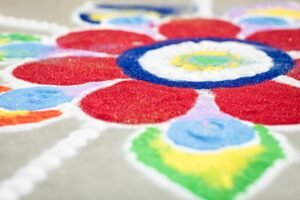Comprehensive Guide of Motorcycle Riding
Overview
Motorcycle riding is an exhilarating hobby that combines the thrill of speed with the freedom of the open road. It involves operating a motorcycle, which is a two-wheeled motor vehicle, and can range from leisurely rides through scenic landscapes to high-adrenaline racing on tracks. This hobby appeals to a diverse group of enthusiasts who appreciate the mechanics of motorcycles, the sense of adventure, and the camaraderie found within the riding community. Motorcycle riding not only offers a unique way to explore new places but also fosters a deep connection with the machine and the environment. Riders often enjoy customizing their bikes, participating in group rides, and attending motorcycle events, making it a multifaceted and engaging pastime.
History
The history of motorcycle riding dates back to the late 19th century when the first motorized bicycles were developed. The invention of the motorcycle is credited to Gottlieb Daimler and Wilhelm Maybach, who created the first gas-powered motorcycle in 1885. Over the decades, motorcycle technology evolved, leading to the production of various models and styles, including cruisers, sport bikes, and touring motorcycles. The post-World War II era saw a surge in motorcycle popularity, particularly in the United States, where it became associated with freedom and rebellion, epitomized by the rise of motorcycle clubs and the iconic image of the “biker.” Today, motorcycle riding is celebrated in popular culture, with events like Sturgis Motorcycle Rally and Daytona Bike Week drawing thousands of enthusiasts each year.
Popularity and Demographics
Motorcycle riding has a broad appeal, attracting individuals from various demographics. According to the Motorcycle Industry Council, there are over 8 million registered motorcycles in the United States, with a growing number of riders aged 18 to 34. This hobby is particularly popular among men, although the number of female riders has been steadily increasing, with women now representing about 20% of the riding community. The rise of motorcycle training programs and safety courses has made it easier for newcomers to enter the hobby, contributing to its growth. Additionally, social media platforms and online forums have created vibrant communities where riders can share experiences, tips, and organize group rides, further enhancing the popularity of motorcycle riding as a fulfilling and adventurous hobby.
Sponsored Hobbyists and Vendors
Become a Sponsor!
Affiliate Disclaimer: Throughout some sections below, Hobby Spotlight may suggest some tools, equipment or material using affiliate links. By purchasing any of those items, Hobby Spotlight may earn a small commission. This helps fund our website, content and services without directly charging our users.
Getting Started
Essential Motorcycle Gear:
Beginner
- Motorcycle Helmet: A DOT-approved helmet for safety while riding.
- Motorcycle Gloves: Protective gloves designed for motorcycle riding.
- Riding Jacket: A durable jacket with protective padding.
- Motorcycle Boots: Sturdy boots that provide ankle protection.
- Basic Tool Kit: Essential tools for minor repairs and maintenance.
Intermediate
- Motorcycle Maintenance Manual: A guide for servicing and maintaining your motorcycle.
- Motorcycle Cover: A protective cover to shield your motorcycle from the elements.
- GPS Navigation System: A device for navigation while on long rides.
- Bluetooth Communication System: Allows communication with other riders while on the road.
- Motorcycle Luggage System: Storage solutions for carrying gear on longer trips.
Basic Requirements and Initial Setup:
- Motorcycle License: Obtaining a valid motorcycle license is essential for legal riding. This often involves passing a written test and a practical riding exam.
- Protective Gear: Investing in high-quality protective gear, including a helmet, gloves, jacket, pants, and boots, is crucial for safety while riding.
- Maintenance Tools: Having basic tools for motorcycle maintenance, such as wrenches, screwdrivers, and tire repair kits, ensures your bike remains in good condition.
Fundamental Skills to Learn:
- Balance and Control: Mastering balance and throttle control is vital for safe and smooth riding.
- Braking Techniques: Learning how to use both front and rear brakes effectively can prevent accidents and improve stopping distance.
- Cornering: Understanding how to lean into turns and navigate corners safely is essential for riding on various terrains.
- Situational Awareness: Developing the ability to anticipate and react to other road users and environmental conditions enhances safety.
- Basic Maintenance: Knowing how to perform routine checks and maintenance, such as oil changes and tire pressure checks, keeps your motorcycle in optimal condition.
Sub-Hobby/Common Activities:
- Long-Distance Touring: Planning and embarking on extended motorcycle trips, often involving scenic routes and overnight stays.
- Off-Road Riding: Exploring unpaved trails and rugged terrains, requiring specialized bikes and skills.
- Motorcycle Customization: Modifying and personalizing motorcycles to enhance performance or aesthetics.
- Track Days: Participating in organized events at racetracks to improve riding skills and experience high-speed riding in a controlled environment.
- Group Rides: Joining fellow enthusiasts for social rides, fostering community and shared experiences.
Terminology:
- CC (Cubic Centimeters): A measurement of engine displacement, indicating the size and power of the motorcycle engine.
- Torque: A measure of rotational force produced by the engine, affecting acceleration and pulling power.
- Lean Angle: The angle at which a motorcycle leans during a turn, crucial for maintaining traction and stability.
- Throttle: The control mechanism that regulates the engine’s power output, affecting speed and acceleration.
- Clutch: A device that engages and disengages the engine from the transmission, allowing for smooth gear changes.
- ABS (Anti-lock Braking System): A safety feature that prevents wheel lock-up during hard braking, enhancing control.
- Chain Drive: A common method of transferring power from the engine to the rear wheel using a chain and sprockets.
- Fairing: The bodywork on a motorcycle that reduces wind resistance and improves aerodynamics.
- Rider Position: The posture a rider adopts while on the motorcycle, affecting comfort and control.
- Scrambler: A type of motorcycle designed for both on-road and off-road riding, often featuring a rugged design.
Advanced Topics and Specializations
Advanced Tools and Equipment:
- Motorcycle GPS Navigation System: A high-end GPS system designed specifically for motorcycles, featuring weather-resistant design and route planning for optimal rides.
- Bluetooth Motorcycle Helmet: A helmet equipped with Bluetooth technology for hands-free communication and music streaming while riding.
- Motorcycle Maintenance Tool Kit: A comprehensive tool kit that includes specialized tools for advanced motorcycle maintenance and repairs.
- Riding Gear with Impact Protection: High-quality riding jackets and pants with built-in armor for enhanced safety and comfort during rides.
- Motorcycle Tire Pressure Monitoring System: An advanced system that monitors tire pressure in real-time, providing alerts for any issues while riding.
Advanced Projects and Achievements:
- Long-Distance Touring: Successfully completing cross-country motorcycle trips, exploring diverse landscapes and cultures while mastering navigation and endurance skills.
- Custom Bike Builds: Designing and assembling personalized motorcycles, focusing on aesthetics, performance upgrades, and unique modifications that reflect individual style.
- Motorcycle Safety Courses: Achieving certification in advanced riding techniques and safety protocols, enhancing personal riding skills and promoting safe riding practices within the community.
Advanced Techniques and Methods:
- Cornering Techniques: Mastering body positioning and throttle control to navigate curves safely and efficiently, improving overall riding performance.
- Maintenance and Repair Skills: Gaining proficiency in performing routine maintenance tasks such as oil changes, tire replacements, and brake adjustments to ensure optimal bike performance.
- Riding in Various Conditions: Developing skills to ride safely in different weather conditions, including rain, snow, and off-road terrains, enhancing adaptability and confidence.
Specializations and Niche Areas:
- Adventure Riding: Focusing on off-road and dual-sport motorcycles, exploring rugged terrains and remote locations.
- Vintage Motorcycle Restoration: Specializing in restoring classic motorcycles to their original condition, preserving history and craftsmanship.
- Track Racing: Engaging in competitive racing on closed circuits, emphasizing speed, precision, and advanced riding techniques.
- Motorcycle Touring: Planning and executing long-distance trips, including route planning, gear selection, and travel logistics.
- Electric Motorcycle Riding: Exploring the growing field of electric motorcycles, focusing on sustainability and innovative technology.
Future Trends and Innovations:
- Increased adoption of electric motorcycles, promoting eco-friendly transportation options.
- Advancements in smart helmet technology, integrating communication systems and augmented reality features.
- Growth of motorcycle-sharing programs, making riding more accessible to a broader audience.
- Enhanced safety features in motorcycles, such as anti-lock braking systems (ABS) and traction control.
- Development of connected motorcycle technology, allowing for real-time diagnostics and performance tracking.
Technology Integrations:
- GPS Navigation Systems: Utilizing advanced navigation tools specifically designed for motorcycles, providing real-time traffic updates and route optimization.
- Mobile Apps for Riders: Accessing apps that offer community features, ride tracking, and maintenance reminders to enhance the riding experience.
- Wearable Technology: Implementing smartwatches and fitness trackers to monitor health metrics while riding, promoting safety and awareness.
- Online Forums and Communities: Engaging with fellow riders through digital platforms to share experiences, tips, and advice.
- Virtual Reality Training: Using VR technology to simulate riding scenarios for training and skill development in a safe environment.
Further Learning and Resources
Books:
- The Essential Guide to Motorcycle Maintenance by Mark Zimmerman: This book covers the basics of motorcycle maintenance, making it perfect for new riders looking to understand their bikes better.
- Motorcycle Basics Techbook by Matthew Coombs: An introductory guide that explains the fundamental concepts of motorcycle mechanics and riding techniques for beginners.
- Rider’s Guide to Motorcycling by the Motorcycle Safety Foundation: A comprehensive guide that introduces new riders to safe riding practices and essential skills for motorcycle operation.
- Proficient Motorcycling: The Ultimate Guide to Riding Well by David L. Hough: This book delves into advanced riding techniques and strategies for experienced motorcyclists looking to enhance their skills.
- The Art of Motorcycle Racing by Keith Code: A deep dive into the principles of motorcycle racing, offering insights and techniques for riders ready to take their skills to the next level.
- Twist of the Wrist II: The Motorcycle Survival Guide by Keith Code: An advanced guide that focuses on the mental and physical aspects of riding, aimed at helping experienced riders refine their techniques.
Websites:
- Motorcycle.com, https://www.motorcycle.com – A comprehensive resource for motorcycle news, reviews, and buying guides.
- Cycle World, https://www.cycleworld.com – Offers expert reviews, motorcycle news, and tips for riders of all levels.
- RideApart, https://www.rideapart.com – A community-driven site featuring articles, reviews, and forums for motorcycle enthusiasts.
- Motorcycle Safety Foundation, https://www.msf-usa.org – Provides safety courses, resources, and information for safe riding practices.
- RevZilla, https://www.revzilla.com – An online retailer specializing in motorcycle gear, parts, and accessories, with expert reviews and guides.
Courses:
- Motorcycle Safety Foundation Basic Rider Course, https://www.msf-usa.org – A foundational course for new riders focusing on safety and basic riding skills.
- Advanced Rider Course by MSF, https://www.msf-usa.org – Designed for experienced riders to enhance their skills and safety awareness.
- Udemy Motorcycle Riding Courses, https://www.udemy.com/courses/search/?q=motorcycle+riding – A variety of courses covering different aspects of motorcycle riding for all skill levels.
- Skillshare Motorcycle Maintenance Classes, https://www.skillshare.com/browse/motorcycle – Classes focused on motorcycle maintenance and repair for enthusiasts looking to learn more.
- Rider Academy, https://www.rideracademy.com – Offers comprehensive training programs for new and experienced riders, including on-road training.
Content Creators and Community
Content Creators:
- FortNine (YouTube): A channel dedicated to motorcycle culture, gear reviews, and riding tips, known for its engaging storytelling and high-quality production.
- MotoJitsu (YouTube): Focuses on motorcycle training and safety, offering practical riding techniques and skills development for all levels of riders.
- Harley-Davidson (Instagram): The official account of the iconic motorcycle brand, showcasing stunning bikes, events, and the lifestyle surrounding motorcycle riding.
- The Missenden Flyer (YouTube): A motorcycle enthusiast sharing reviews, ride-outs, and tips, with a focus on the UK biking community.
- Bike World (YouTube): Offers comprehensive motorcycle reviews, news, and insights into the latest models and trends in the biking world.
- Motorcycle USA (Instagram): A platform for motorcycle enthusiasts to share their rides, experiences, and connect with fellow riders.
- RiderCoach (YouTube): Provides educational content on motorcycle safety, riding techniques, and tips for new riders to enhance their skills.
Online Forums and Social Media Groups:
- Reddit – /r/motorcycles: A vibrant community for motorcycle enthusiasts to discuss bikes, share experiences, and seek advice.
- Facebook Motorcycle Groups: Various groups dedicated to specific brands, types of bikes, and riding experiences, fostering community and support.
- Motorcycle Forum: An online platform for discussions on motorcycle maintenance, modifications, and riding tips.
- Instagram Hashtags (#motorcycle, #bikelife): Follow trending posts and connect with other riders through shared experiences and visuals.
- Pinterest Boards: Explore boards filled with motorcycle gear, riding tips, and travel inspiration for motorcycle enthusiasts.
Local Clubs and Organizations:
- Motorcycle Riding Clubs: Local clubs that organize group rides, events, and community outreach for motorcycle enthusiasts.
- Women on Wheels: An organization dedicated to female motorcyclists, offering support, events, and networking opportunities.
- Local Motorcycle Dealerships: Often host events, workshops, and riding classes for the community.
- Motorcycle Safety Foundation: Provides training and resources for safe riding practices and skills development.
- Meetup Groups: Platforms like Meetup.com host local motorcycle riding groups and social gatherings for enthusiasts.
Events, Meetups, and Conventions:
- Sturgis Motorcycle Rally: One of the largest motorcycle rallies in the world, featuring live music, bike shows, and community events.
- Local Bike Nights: Regular gatherings at local venues where riders can meet, share stories, and enjoy food and music.
- Motorcycle Shows: Events showcasing the latest models, gear, and accessories, often featuring demos and competitions.
- Rider Training Workshops: Local events focused on improving riding skills and safety awareness.
- Motorcycle Conventions: Gatherings that combine exhibitions, competitions, and networking opportunities for motorcycle enthusiasts.
Associated Hobbies
- Camping: Motorcycle riders often enjoy camping as it allows them to explore remote areas and enjoy nature. Many riders pack camping gear on their bikes for weekend getaways or longer trips, combining the thrill of riding with the tranquility of the outdoors.
- Photography: Capturing the beauty of the landscapes and experiences encountered while riding is a popular hobby among motorcyclists. Many riders invest in cameras or smartphones to document their journeys and share their adventures with others.
- Mechanics and Maintenance: Understanding how to maintain and repair motorcycles can be a rewarding hobby. Many riders take pride in working on their bikes, learning about engine mechanics, and performing upgrades or modifications.
- Traveling: Motorcycle riding often goes hand in hand with travel. Riders enjoy exploring new places, whether it’s scenic routes, national parks, or cross-country trips, making travel a significant aspect of the hobby.
- Motorcycle Clubs: Joining a motorcycle club can enhance the riding experience. Clubs provide a sense of community, opportunities for group rides, and events that bring together like-minded enthusiasts.
- Customizing Bikes: Many motorcycle riders enjoy customizing their bikes to reflect their personal style. This can include changing the paint job, adding accessories, or modifying parts for better performance.
- Safety Training: Engaging in safety training and courses is a vital hobby for many riders. Learning advanced riding techniques and safety measures not only enhances skills but also promotes safer riding practices.
- Motorcycle Shows and Events: Attending motorcycle shows, rallies, and events is a popular hobby. These gatherings provide opportunities to meet other enthusiasts, see new models, and participate in various activities related to motorcycle culture.
Cost and Budgeting
Initial Investment and Ongoing Costs:
- Initial Investment: The cost to start motorcycle riding can vary significantly based on the type of motorcycle you choose. A new entry-level motorcycle can range from $5,000 to $10,000, while used motorcycles can be found for as low as $2,000. Additionally, you’ll need to budget for safety gear, including a helmet, jacket, gloves, and boots, which can add another $300 to $1,000 to your initial costs.
- Ongoing Costs: Ongoing expenses include insurance, which can range from $100 to $1,000 annually depending on your location and riding history. Maintenance costs, such as oil changes, tire replacements, and general upkeep, can average around $500 to $1,000 per year. Fuel costs will depend on your riding habits and the motorcycle’s fuel efficiency.
Budget-Friendly Options:
- Used Motorcycles: Purchasing a used motorcycle can significantly reduce your initial investment. Look for reputable sellers or dealerships that offer certified pre-owned bikes.
- Safety Gear Sales: Keep an eye out for sales on safety gear at local motorcycle shops or online retailers. Many stores offer discounts during the off-season.
- Motorcycle Clubs: Joining a motorcycle club can provide access to group discounts on insurance and gear, as well as opportunities for shared maintenance costs.
Where to Buy:
- Local Dealerships: Visiting local motorcycle dealerships allows you to see and test ride various models, and they often have financing options available.
- Online Marketplaces: Websites like CycleTrader, Craigslist, and Facebook Marketplace can be great places to find both new and used motorcycles at competitive prices.
- Motorcycle Shows: Attending motorcycle shows can provide opportunities to see a wide range of models, meet dealers, and often find exclusive deals.
Money Making
How to Turn Motorcycle Riding into a Profession or Side Hustle:
- Motorcycle Tour Guide: Leverage your knowledge of scenic routes and local attractions by becoming a motorcycle tour guide. You can organize and lead group rides, providing participants with an unforgettable experience while sharing your passion for riding and the open road.
- Motorcycle Mechanic or Customizer: If you have mechanical skills, consider turning your hobby into a profession by offering motorcycle repair and customization services. You can work from home or open a shop, catering to fellow riders who need maintenance, upgrades, or custom builds.
- Motorcycle Safety Instructor: With the right certifications, you can become a motorcycle safety instructor, teaching new riders the skills and knowledge they need to ride safely. This can be done through local community colleges or private organizations, and it allows you to share your expertise while earning an income.
- Motorcycle Content Creator: Start a blog, YouTube channel, or social media account focused on motorcycle riding. Share tips, reviews, and personal experiences to build an audience. You can monetize your content through sponsorships, affiliate marketing, and merchandise sales, turning your passion into a profitable venture.
- Motorcycle Apparel and Gear Business: If you have a flair for design, consider creating and selling motorcycle-related apparel and gear. This could include jackets, helmets, gloves, and accessories that cater to the riding community. Focus on quality and style to attract fellow enthusiasts.
Benefits and Enjoyment
Physical, Mental, and Social Benefits:
- Physical Activity: Motorcycle riding is an exhilarating way to engage in physical activity. It requires balance, coordination, and core strength, as riders must maintain control of the bike while navigating various terrains. Regular riding can improve muscle tone and cardiovascular health.
- Mental Clarity: The focus required to ride a motorcycle can lead to improved mental clarity and concentration. Riders often experience a sense of freedom and adventure, which can reduce stress and anxiety, providing a mental escape from daily routines.
- Social Connection: Motorcycle riding fosters a strong sense of community among enthusiasts. Joining riding clubs or participating in group rides allows individuals to connect with others who share their passion, creating friendships and a supportive network.
Success Stories and Inspirational Examples:
- Evel Knievel: A legendary stunt performer, Evel Knievel became an icon in the motorcycle world. His daring jumps and stunts captivated audiences and inspired countless individuals to pursue motorcycle riding and stunts, showcasing the thrill and excitement of the hobby.
- Charley Boorman: Known for his adventurous spirit, Charley Boorman gained fame through his motorcycle journeys around the world, documented in the TV series ‘Long Way Round’ and ‘Long Way Down.’ His travels have inspired many to explore the world on two wheels, emphasizing the freedom and adventure that motorcycle riding offers.
- Maria Costello: As a professional motorcycle racer, Maria Costello has broken barriers in a male-dominated sport. Her achievements in racing and her advocacy for women in motorcycling have inspired many to pursue their passion for riding, regardless of gender.
Ways to Enjoy and Grow in the Hobby:
- Take a Safety Course: Enrolling in a motorcycle safety course not only enhances your riding skills but also boosts your confidence on the road. Learning about safe riding techniques and traffic laws is essential for any rider.
- Join a Riding Group: Connecting with local riding groups or clubs can enhance your experience. These communities often organize group rides, events, and workshops, providing opportunities to learn from experienced riders and make new friends.
- Explore New Routes: Challenge yourself by exploring new roads and terrains. Whether it’s scenic coastal routes or winding mountain roads, discovering new places can keep the hobby exciting and invigorating.
Challenges and Solutions
Common Challenges Faced by Hobbyists:
- Cost of Maintenance and Gear: Motorcycle riding can be an expensive hobby due to the costs associated with purchasing a bike, gear, and ongoing maintenance. Riders often face challenges in budgeting for repairs, insurance, and safety equipment.
- Safety Risks: Riding a motorcycle comes with inherent risks, including accidents and injuries. New riders may struggle with the learning curve of handling a motorcycle safely, which can be daunting and requires practice and caution.
- Weather Conditions: Weather can significantly impact riding experiences. Rain, snow, and extreme temperatures can make riding uncomfortable or dangerous, leading to challenges in planning rides and staying safe.
- Finding Riding Partners: Many motorcycle enthusiasts enjoy riding in groups, but finding like-minded individuals can be a challenge. Riders may struggle to connect with others who share their passion for the open road.
Tips for Overcoming These Challenges:
- Budget Wisely: Create a budget that includes all aspects of motorcycle riding, such as gear, maintenance, and insurance. Look for ways to save, such as purchasing used gear or taking advantage of discounts on services.
- Take a Safety Course: Enroll in a motorcycle safety course to improve your riding skills and confidence. These courses often provide valuable training on handling different situations and can help reduce the risk of accidents.
- Check Weather Reports: Always check the weather forecast before heading out for a ride. Plan your trips around favorable weather conditions and be prepared with appropriate gear for unexpected changes.
- Join Riding Groups: Look for local motorcycle clubs or online communities where you can connect with other riders. Participating in group rides can enhance your experience and provide a sense of camaraderie.
Safety Considerations and Best Practices:
- Always wear a DOT-approved helmet and appropriate protective gear, including gloves, jackets, and boots, to minimize injury in case of an accident.
- Perform regular maintenance checks on your motorcycle, including tire pressure, brakes, and lights, to ensure it is in safe working condition.
- Stay visible to other drivers by wearing bright colors and using reflective gear, especially during low-light conditions.
- Follow traffic laws and ride defensively, being aware of your surroundings and anticipating the actions of other road users.
- Never ride under the influence of alcohol or drugs, and avoid distractions such as mobile devices while riding.
Conclusion and Encouragement
Recap of Key Points:
- Motorcycle riding is an exhilarating hobby that combines the thrill of speed with the freedom of the open road, allowing riders to explore diverse landscapes and cultures.
- Safety gear is crucial; investing in a quality helmet, protective clothing, and other safety equipment can significantly reduce the risk of injury while riding.
- There are various types of motorcycles to suit different riding styles, including cruisers, sport bikes, touring bikes, and adventure bikes, making it accessible for everyone.
- Joining a motorcycle community or club can enhance your experience, providing opportunities for group rides, events, and camaraderie among fellow enthusiasts.
- Motorcycle riding can also be a practical mode of transportation, offering benefits such as fuel efficiency and easier parking in urban areas.
Encouragement to Start and Enjoy the Hobby:
- Motorcycle riding is an accessible hobby for many; with a valid motorcycle license and a suitable bike, you can quickly embark on your riding journey.
- It offers a unique way to experience the world, allowing you to feel the wind on your face and immerse yourself in your surroundings, making every ride an adventure.
- Riding can be a fantastic way to relieve stress and improve mental well-being, as the focus required while riding can help clear your mind and provide a sense of freedom.
Final Tips and Motivational Thoughts:
- Always prioritize safety by taking a motorcycle safety course, which can enhance your skills and confidence on the road.
- Stay informed about motorcycle maintenance to ensure your bike remains in top condition, which is essential for both safety and performance.
- Embrace the journey and enjoy the ride; every trip, whether short or long, offers opportunities for new experiences and memories that will last a lifetime.

















